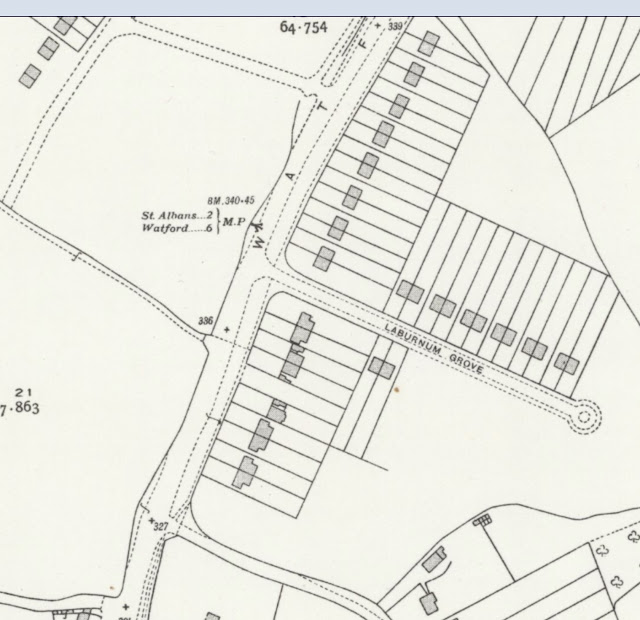The former Reading & Hatfield Turnpike road in the 18th and 19th centuries divided the north and south sides of Ellenbrook, Oaklands and Fleetville before the tolls were removed and the road was maintained at public expense by the Country authority. Today we call it Hatfield Road which continues on its way through St Albans, St Stephen's Hill and Watford Road to Watford and Reading.
 |
| The mile marker along Hatfield Road outside Popefield Farm, near Smallford. |
There is plenty we don't know about the turnpike's workings and toll collecting, but most of us are familiar with the Listed mile markers, still in position along the north side of the road. If you wish to know more about the road in its toll days visit:
http://www.stalbansowneastend.org.uk/topic-selection/turnpike-road/
The mile markers shown on that webpage are the only ones remaining; most of those following St Stephen's Hill through to Rickmansworth are missing, although they are referred to on the 1937 survey of the Ordnance Survey maps, and it is therefore assumed they remained by the roadside at least until then. Many people are also aware that road signs were removed as a defensive measure at the beginning of WW2. However, since no-one seems to recall those east of St Albans being removed and then returned, can the local authority be relied on to have treated those south of the city in the same way, even if it was the same authority? Clearly not, since they are still not in place.
It has been suggested that the easiest method of managing such heavy metal objects when trying to remove them was to dig a hole beside each one, tip it in and cover it – job done! But was that the full story and are the posts still there, below the ground nearby?
The focus of this post is the former mile post close to the Noke Hotel.
Quite by chance recently the Editor was following proposals during the 1930s for Hertfordshire County Council to close small rural schools and move any residual pupils into nearby town schools. One such building was the school room in Watford Road which languished with 30 children by the time it closed in the 1930s, which is strange on two counts. First, the Burston estate was being broken up and developed for housing, becoming the formative Chiswell Green. The council, meanwhile pressed on with a new JMI school at Mount Pleasant, Bricket Wood; quite a distance for walking children from new St Stephen's and Chiswell Green homes.The second consideration the council did not take into account was the completion of the St Albans By-Pass, linking up with Watford Road as far as the A41. When first built it was a fast traffic single carriageway, but children from Chiswell Green and St Stephen's would have needed to cross this bypass to reach their new Mount Pleasant, for which the council provided a crossing patrol four times a day to supervise up to one hundred children across the bypass.
For our evidence it was fortunate the council elected to make the crossing point opposite Lye Lane; and it was also fortunate the Herts Advertiser considered the decision worthy of sending a staff photographer to the site. The picture was taken as the children returned home at lunchtime and was standing where the bus layby is today. It was taken at the beginning of June 1939. What a responsibility for Mr H J Cornwall, the crossing man holding the board announcing "STOP. Crossing Patrol".Now, just look between the second and third children from the right. Along the fence line, and sitting just where the map says it should, is the turnpike mile marker, 3 miles from St Albans and 5 from Watford. The Herts Advertiser has proved it.
However, there is no point using a metal detector at the site today in the hope of locating the buried object. Several improvements have been made to the bypass since then, including a second carriageway on that side of the road. It may now be under the newer tarmac, or may have been removed from the site along with countless tons of rubble and subsoil in the construction of the dualled road.But at least we still have photographed evidence it was present at the correct spot along the road in June 1939 and that several times a day it was passed by dozens of children on their way to and from Mount Pleasant School.
 |
| The Watford Road/Laburnum Road junction today. Do you think anyone took a photograph here sometime before 1939? COURTESY GOOGLE EARTH |
The account this week may not be be about the East End, but it is the same road which connects the two. Let's try and solve the puzzle of another turnpike mile marker.






No comments:
Post a Comment